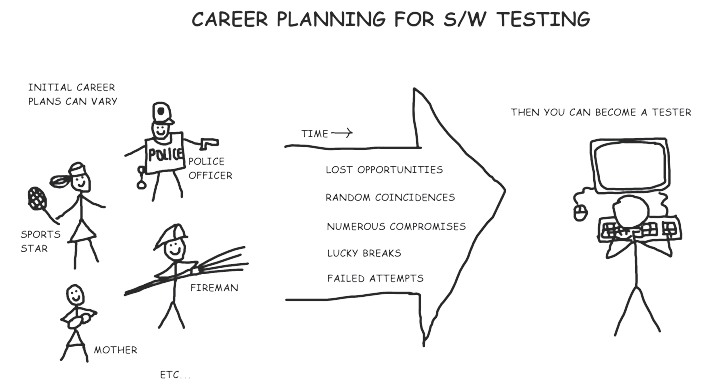 Teams involved with developing, managing, and maintaining software often have misconceptions about software testing. Potential workers and new testers feel lot of frustration due to these common misconceptions and misbeliefs and make them unhappy about their work. Companies have lost their clients when they failed to counter these myths, understand the importance of software testing, QA project plan and difference between goal and mindset of testing which is different for developer and for tester.
Teams involved with developing, managing, and maintaining software often have misconceptions about software testing. Potential workers and new testers feel lot of frustration due to these common misconceptions and misbeliefs and make them unhappy about their work. Companies have lost their clients when they failed to counter these myths, understand the importance of software testing, QA project plan and difference between goal and mindset of testing which is different for developer and for tester.
I’ve worked closely with IT industry in past 10 years and especially with software testing business units. I have seen how management formulates the career growth plans for developers and testers based on these misconceptions. They promote a strong belief that software testing job is inferior to software development job. I have seen projects falling apart due to these misconceptions and partiality of management towards developers. They don’t understand that both software development and testing are equally valuable for the quality of the software product and they are interlinked for project success.
I have listed few common misconceptions about software testing which are popular in IT industry. Few of these can raise series of arguments, but objectively these are very common misconceptions and practices that are followed in mid and small level software vendors across globe. In my case, I hear point 1, 2, 16, 22 and 24 on daily basis. Let me know yours.
- Software testing is no brainier job and doesn’t require any specific skills. I found this interesting image to convey exactly what management and software developers feel about testers.

- Testing efforts are standard 20% of overall development estimates.
- Involving testers in early stage of project is just a formality and can be skipped.
- Testers are required to act as business analyst and understand the project flow by themselves without participating in any kickoff meeting and project discussions.
- Testers shouldn’t give recommendation as it causes unnecessary project delays.
- In entire team, only testers are required to have excellent communication skills as they report bugs.
- Developers make good testers and both have same goals in deliverable.
- Website, desktop or mobile testing is less prestigious then software development.
- Manual Testing is inferior to Automation Testing.
- Unit testing should be done by tester not by developer.
- Testing team is a liability and an expense to company as only small amount of testing is required to validate the development.
- Testing process is only meant for corporate website and marketing collateral.
- To save time, testing can be done on developer’s machine.
- Testing with agile methodology means less documentation.
- Testers should follow developers work schedule.
- Testers don’t get along with developers. Myth which is majorly promoted by management as their divide and rule policy. This is one myth which can tarnish any project if not proactively controlled by project managers.
- Involving developer will speed up the implementation of test automation.
- Automation testers do not have to bother themselves with manual testing.
- Automated testing requires minimum of tester’s activity and attention.
- Testers are mad, bug hunters and they are the forever skeptics.
- Testers do not need any professional training and certifications. They can train themselves while working on their projects.
- Exhaustive testing can make software Bug Free.
- Software Testing has nothing to do with creativity, all they do is write or design test cases.
- Quality testing means number of test cases executed by tester in a day.
- Test case Reviews are a one-time effort.

Pingback: 25 Common Misconceptions about Software Testing...
Pingback: The Ultimate Cheat Sheet on Bug reporting